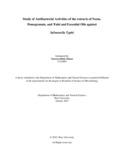Study of antibacterial activities of the extracts of Neem, Pomegranate, and Tulsi and essential oils against Salmonella Typhi

View/
Date
2022-01Publisher
Brac UniversityAuthor
Binte Ehsan, TazreenMetadata
Show full item recordAbstract
The microorganism occupied for this research wasSalmonella,itisa gram-negative, rod-shaped,
facultative anaerobic bacteriumthat belongs to the family Enterobacteriaceae.
Recently it has been observed that an increasing number of bacteria are building resistance to
synthetic antibiotics which hampers controlling infective health conditions. It’s familiar to
everyone that most antibiotics no longer function; infections are getting worst or impossible to
manage. It is time to discover a substitute for antibiotics from organic sources
Medicinal plants are considered as the abundant bioresource of drugs for conventional
medicines, food supplements, and chemical essence for artificial drugs. Nowadays, researchers
are progressively focusing their consideration in investigating herbal products due to the higher
resistance of microorganisms against the presently used antibiotics and pharmaceutical
companies are seeking options for the costly production of synthetic drugs. Medicinal plants can
be the method to alternate this condition as most of them are secure with minor side effects. In
the present work, ethanol and aqueous extracts of Neem (Azadirachta indica), Tulsi (Ocimum
sanctum), and Pomegranate (Punica granatum) were impinged to microbial sensitive test using
disk diffusion method
The greatest and notable antibacterial activity (zone of inhibition) was noticed with ethanolic
extract of Neem (Azadirachta indica) extract against Salmonella (12mm) which is the most
effective. No antimicrobial action was found with aqueous extracts of all the three medicinal
plants against the chosen bacteria. However, three conventional antibiotics were employed as a
positive control against the chosen bacteria which had demonstrated antimicrobial action. Four oils (thyme oil,rosemary oil,orange oil and clove oil) were chosen for this study to consider
the impact of different concentrations on hindrance of Salmonella.Thyme,Orange,Clove and
Rosemary oil have been utilized to alleviate stomach torment for centuries. It makes a difference
to calm the nerves and help in assimilation in case you eat something that doesn’t concur with
you. Put one or two drops of the oils in a refreshment to utilize it for stomach torment purposes
Past reports of in vitro study appears that thyme, orange, rosemary, and clove oils were a bit
successful against Salmonella.. Nowadays, researchers are progressively turning their focus in
investigating herbal products to combat the increasing occurrences of microbial drug resistance.
This study of antibacterial activity against chosen pathogen was done by the Disk diffusion
method and Agar well diffusion method. In most cases, the inhibition of bacterial growth after
one day of incubation demonstrated better results. Thyme oil showed the best inhibition against
the bacteria chosen for this research whereas Rosemary oil also showed maximum and orange oil
showed minimum inhibition against S.typhi
